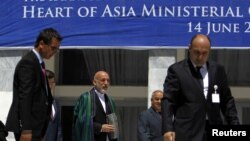ISLAMABAD - Foreign ministers and diplomats from 30 countries gathered Thursday in Kabul to discuss the future of Afghanistan.
The one-day meeting aimed to map out how regional and other countries can work together to stabilize Afghanistan and build up its economy. But not all the nations taking part in the meeting are allies.
Political differences and competing goals between India, China, Pakistan, Russia, Iran, Saudi Arabia and the United States make the overall objective of a stable Afghanistan that much harder to reach.
Afghan President Hamid Karzai said Afghanistan will maintain a diplomatic balance with both with the international community and its neighbors.
"Afghanistan has fortunately so far been successful in maintaining an equilibrium of relationships and we by all means intend to continue this," he said.
"Afghanistan has fortunately so far been successful in maintaining an equilibrium of relationships and we by all means intend to continue this," he said.
Analyst Ahmad Majidyar of the American Enterprise Institute says Karzai is trying to use diplomacy to get Pakistan to combat militants on its soil.
“In added negotiations with the regional countries, especially China and Russia who have influence with Pakistan, he wants to bring Pakistan on board. But I am very much less optimistic that will result in anything significant because the Afghan government has made those demands in other meetings with the Pakistani government in the past," he said.
Cooperation, Mr. Karzai said Thursday, is crucial to ending terrorism, radicalism and violence. He also emphasized the importance of negotiating peace with the Taliban, and called on both Saudi Arabia and Pakistan to do more to achieve that goal.
Pakistan's Prime Minster Yousuf Raza Gilani said Thursday that Afghanistan was of prime importance to Islamabad.
"For us the most important capital in the world is Kabul, and the government of Kabul is the most important partner. A peaceful, stable and sovereign Afghanistan is an absolute prerequisite for stability and peace in Pakistan," he said.
"For us the most important capital in the world is Kabul, and the government of Kabul is the most important partner. A peaceful, stable and sovereign Afghanistan is an absolute prerequisite for stability and peace in Pakistan," he said.
Donor countries contributing to Afghanistan’s security and economy say they are concerned about corruption eroding Afghanistan's security goals. Speaking Thursday, Karzai said he will use his remaining time in office to fight corruption.
"It is our job for the next two years that I am in office, to undertake a fundamentally stronger activity towards improved, better, governance in Afghanistan," he said.
Meanwhile strained ties between the U.S. and Pakistan surfaced at the conference.
A dispute between Washington and Islamabad has led to Pakistan shutting down supply routes to Afghanistan, a move that U.S. Defense Secretary Leon Panetta said Wednesday was costing the United States some $100 million a month.
But Pakistan’s Foreign Affairs spokesman Moazzam Ahmad Khan said Thursday in Islamabad that differences between the two countries were more than just financial.
"There are several issues which we are trying to discuss here in the light of parliament’s recommendation that involves supply lines, that involves drone attacks, that involve apology issues and all," he said.
"There are several issues which we are trying to discuss here in the light of parliament’s recommendation that involves supply lines, that involves drone attacks, that involve apology issues and all," he said.
Islamabad has repeatedly demanded that Washington apologize for a drone strike last November that mistakenly killed 24 Pakistani soldiers and prompted Pakistan to shut down NATO supply lines. Washington has said it regretted the incident





